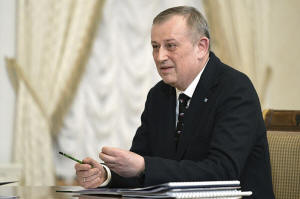Ukrainian drones strike one of Russia's top oil refineries, sparking
fire
[September 15, 2025]
By The Associated Press
Ukrainian drones have struck one of Russia’s largest oil refineries,
sparking a fire, Russian officials and Ukraine’s military said Sunday.
The overnight strike on the Kirishi refinery, in Russia's northwestern
Leningrad region, follows weeks of Ukrainian attacks on Russian oil
infrastructure that Kyiv says fuels Moscow’s war effort.
The facility, operated by Russian company Surgutneftegas, produces close
to 17.7 million metric tons per year (355,000 barrels per day) of crude,
and is one of Russia's top three by output.
More than three years since Russia's full-scale invasion of Ukraine,
drones continue to be a key weapon for both sides. Multiple Russian
drones crossed into Poland on Wednesday, prompting NATO to send fighter
jets to shoot them down and underlining long-held concerns that the
fighting might spill over beyond Ukraine's borders.
According to Ukraine’s General Staff, explosions and a fire were
reported at the Kirishi refinery. It posted a photo appearing to show a
blaze and clouds of smoke against a night sky.
Regional Gov. Alexander Drozdenko said that three drones were downed
overnight in the Kirishi area, with falling debris sparking a fire at
the facility. He said that no one was injured, and the blaze was put
out.
Gasoline shortages
As of Sunday afternoon, Russian officials offered no further comment on
the consequences of the strike, and it wasn't immediately possible to
verify these. At least 80 Ukrainian drones were shot down overnight over
Russia, the annexed Crimean Peninsula and the adjacent Sea of Azov,
according to the Russian Defense Ministry.

Ukrainian drones previously targeted the Kirishi refinery in March,
causing minor damage, according to social media posts published at the
time by Drozdenko.
Russia remains the world’s second-largest oil exporter, but a seasonal
rise in demand and sustained Ukrainian drone strikes have caused
gasoline shortages in recent weeks. Gas stations have run dry in some
regions of the country, with motorists waiting in long lines and
officials resorting to rationing or cutting off sales altogether.
To try to ease the shortage, Russia has paused gasoline exports, with
officials on Wednesday declaring a full ban until Sept. 30 and a partial
ban affecting traders and intermediaries until Oct. 31.
Russian railway incidents
Also in the Leningrad region, a diesel locomotive was derailed during
the night, local Gov. Drozdenko said Sunday. He said the incident
occurred near Gatchina south of St. Petersburg. Russia's No. 2 city,
which was known as Leningrad during Soviet times, is surrounded by but
not included in the region of the same name.
[to top of second column]
|

Leningrad Region Governor Alexander Drozdenko speaks to Russian
President Vladimir Putin during their meeting in St. Petersburg,
Russia, Monday, Jan. 29, 2024. (Alexei Danichev, Sputnik, Kremlin
Pool Photo via AP, File)

Drozdenko said the locomotive's driver was trapped in his cabin, and
later died of his injuries while being transported to a hospital. He
added an official investigation would check for signs of sabotage.
Separately, a bomb planted along railway lines in Russia’s Oryol
region has killed three people, according to reports by local Gov.
Andrey Klychkov. He said victims had been inspecting the track, and
identified one as a member of Russia’s National Guard.
According to Klychkov's posts, published late Saturday and Sunday,
the incident happened near the town of Maloarkhangelsk, about 200
kilometers (120 miles) from the Ukrainian border. Russian officials
didn't immediately comment on what caused it.
Cyberattacks mar Russian voting
Elsewhere, as some Russians headed to the polls to elect local
governors and deputies on Sunday, the head of the Russia’s main
electoral body told reporters that it and Russia’s electronic voting
system were facing a large wave of cyberattacks.
Ella Pamfilova, of the Central Election Commission, said that “an
unprecedented attack is underway” on its digital systems, but
assured the public that it wouldn't affect the outcome of the votes.
The commission’s website appeared to be down for much of Sunday,
when 21 out of Russia’s more than 80 regions were set to elect new
governors. Seats in nearly a dozen regional assemblies and various
municipal bodies were also up for grabs.
But few expected a meaningful challenge to President Vladimir
Putin’s United Russia party and its supporters, following a sweeping
crackdown on dissent that came with Moscow’s all-out invasion of
Ukraine on Feb. 24, 2022.
Almost 100 denial-of-service attacks were recorded on Sunday on
online resources linked to the elections, according to Alexander
Izhko of Russia’s media and digital watchdog, Roskomnadzor. Izhko
spoke at a media briefing Sunday. A denial-of-service attack
involves flooding a site with data to overwhelm it and knock it
offline.
Russian officials didn't immediately comment on who they thought
might be behind the alleged attacks.
All contents © copyright 2025 Associated Press. All rights reserved |